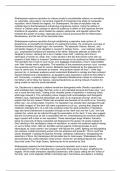Shakespeare explores reputation to critique society's unsustainable reliance on something
so vulnerable, using Iago’s ‘convenient masks’(E.A Honigmann) his ability to manipulate
reputation, which frames the tragedy. For Shakespeare, the idea of reputation may be
outdated due to the Renaissance introducing progressive notions. Using the setting of
Venice- a Catholic state- perhaps to allow his audience to reflect on the hypocrisy and the
limitations of reputation, which fuelled the classist, patriarchal, and bigoted notions that
hindered the growth of society, especially due to cultural processes like the Reformation,
Renaissance, and the rise of the mercantile class.
Shakespeare explores reputation through establishing a pejorative male opinion of
Desdemona, to exemplify the limitations of a patriarchal society. He constructs a preview of
Desdemona before through Iago’s vile comments. The epizeuxis ‘thieves, thieves,’ and
animalistic imagery of ‘your daughter is covered in barbary horse… your nephews neigh to
you,’ emphasises Desdemona’s betrayal of her father. Brabantio attempts to defend his
daughter’s honour, claiming her to be a ‘maiden never bold,’ matching John Knox’s
stereotype of women as ‘weak, frail.’ It also alludes to the fact that women were seen as
property of their father or husband: Desdemona should not do anything her father prohibited.
The asyndetic list of ‘look to your house, your baggage! emphasises a man’s responsibility
over ‘their’ female ward’s reputation. The repetition of the possessive pronoun ‘your’ conveys
the ownership and the need for control. Brabantio feels threatened by the statements of a
man he cannot see: he demands an answer, ‘what profane wretch art thou?,’ while Iago
ignores him. A Jacobean audience would understand Brabantio’s outrage and feel contempt
towards Desdemona’s disobedience, as daughters were expected to submit to their father’s
will. Conversely, a modern audience might understand Desdemona’s desire to contravene
her father’s will to follow her desires, viewing Desdemona as strong instead of wanton for
being unable to meet the social standards.
Yet, Desdemona’s attempts to defend herself are disregarded while Othello’s reputation is
what validates their marriage. But their union is only tolerated because the Duke says, ‘your
son is more fair than black,’ hinting at the versatile power of reputation in subduing chaos,
while Iago induced it. The contrasting colour imagery both acknowledges and disregards
Othello’s race, signifying that stereotypes are seen as an engrained concept, which may
explain that the only reason Othello was accepted was because of his worth as an ‘honorary
white man,’ as Loomba states. However, his reputation has already been damaged through
the hellish imagery of ‘the devil will make a grandsire out of you,’ proving that, despite the
noblemen tolerating him, he is still only accepted under the weak protection of reputation.
Iago also taints Desdemona’s reputation through as the ‘devil was now her ‘Lord,’ who had
violated her, which can be inferred through the association to the ‘devil.’ It may also suggest
that she is promiscuous as she is associated with sin, foreshadowing her eventual downfall:
Iago’s speech left a stain on her reputation. These stereotypes forge Othello’s hamartia,
being his insecurity of being cuckolded and disgraced in the opinion of society instead of
God- alluding to the sacrilegious nature of reputation- to caution his audience against relying
on such a fickle notion. After all, the Bible warned against confining females to such
stereotypes as ‘loose women’ and ‘paragon’ with figures like Judith, fighting and decapitating
her enemies, instead promoting women who are assertive and powerful. This is much like
Queen Elizabeth I, leading the Spanish Armada, ‘defeating’ Catholicism, disregarding the
assertions of Knox. But stereotypes still prevailed due to male power. Shakespeare thus
demonstrates the conflict between what women ‘should be’ and biblical figures like Judith, as
they lived under The Virgin Queen, believing her to be anointed by God.
Shakespeare explores the link between a woman's reputation and a man’s opinion,
accentuated through the noticeable toxic masculinity that poisons the play, amplifying the
tragedy. All the male characters objectify Desdemona, with Cassio calling her the ‘riches of
the ship,’ and, more tragically Othello mimicking Iago’s horrendous accusations, including




